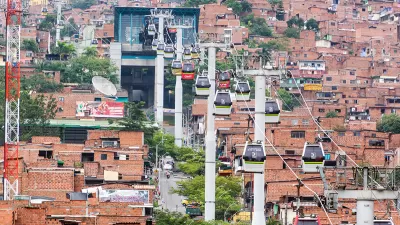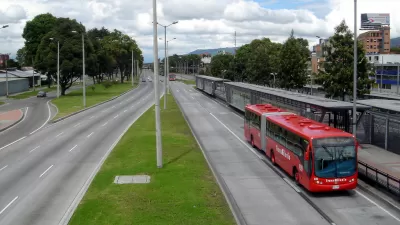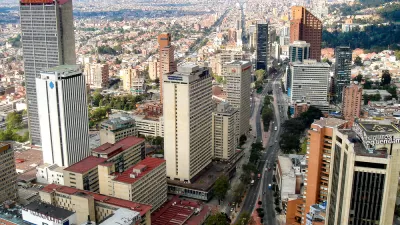The cities of Bogotá and Medellín have made dramatic transformations over the last ten years, driven in large part by their influential mayors. But while one continues to soar, the other is in crisis, reports Justin McGuirk
Two cities in Colombia showcase how the mix of politics and good infrastructure design can work. Bogota, Colombia's capital, utilized transport infrastructure to revitalize their streets. Two past mayors, Antanas Mockus and Enrique Peñalosa, "brought decent sidewalks, bike lanes and the Transmilenio bus service to bypass the capital's crippling traffic – measures that privileged the non-car-owning poor." With current overcrowding, various stalled road projects and the last mayor accused of corruption, Bogota is a city in trouble.
By comparison, Medellin was considered a dangerous city filled with violence and drugs in the 1990s. By the early to mid 2000s, progressive design projects such as Coliseos Juegos Suramericanos, Orquideorama, and Paisajes Emergentes swimming pool complex, led the city's revival, notes McGuirk.
Giancarlo Mazzanti, Colombia's renowned architect, says the focus on "social urbanism" reflected in these projects marks a critical shift in urban policy, "This is a massive U-turn since the days when it was common to speak of 'cutting out the cancer' of the slums. For once, architecture-as-spectacle is not being used as a tool to market the culture industry, but to make poverty visible."
In the hands of mayor Sergio Fajardo, Medellin became a proving ground for innovative urban design. "There are several hybrid library-parks (part community centres and part much-needed public spaces), two cable car systems and, most recently, an outdoor escalator running nearly 400m up the troubled slum of Comuna 13." Fajardo focused on the creation of public spaces for the poor and "he attributed the fall in crime during his term in part to the increase in the amount of public space per citizen."
FULL STORY: Colombia's architectural tale of two cities

Alabama: Trump Terminates Settlements for Black Communities Harmed By Raw Sewage
Trump deemed the landmark civil rights agreement “illegal DEI and environmental justice policy.”

Study: Maui’s Plan to Convert Vacation Rentals to Long-Term Housing Could Cause Nearly $1 Billion Economic Loss
The plan would reduce visitor accommodation by 25% resulting in 1,900 jobs lost.

Planetizen Federal Action Tracker
A weekly monitor of how Trump’s orders and actions are impacting planners and planning in America.

Waymo Gets Permission to Map SF’s Market Street
If allowed to operate on the traffic-restricted street, Waymo’s autonomous taxis would have a leg up over ride-hailing competitors — and counter the city’s efforts to grow bike and pedestrian on the thoroughfare.

Parklet Symposium Highlights the Success of Shared Spaces
Parklets got a boost during the Covid-19 pandemic, when the concept was translated to outdoor dining programs that offered restaurants a lifeline during the shutdown.

Federal Homelessness Agency Places Entire Staff on Leave
The U.S. Interagency Council on Homelessness is the only federal agency dedicated to preventing and ending homelessness.
Urban Design for Planners 1: Software Tools
This six-course series explores essential urban design concepts using open source software and equips planners with the tools they need to participate fully in the urban design process.
Planning for Universal Design
Learn the tools for implementing Universal Design in planning regulations.
Caltrans
Smith Gee Studio
Institute for Housing and Urban Development Studies (IHS)
City of Grandview
Harvard GSD Executive Education
Toledo-Lucas County Plan Commissions
Salt Lake City
NYU Wagner Graduate School of Public Service





























